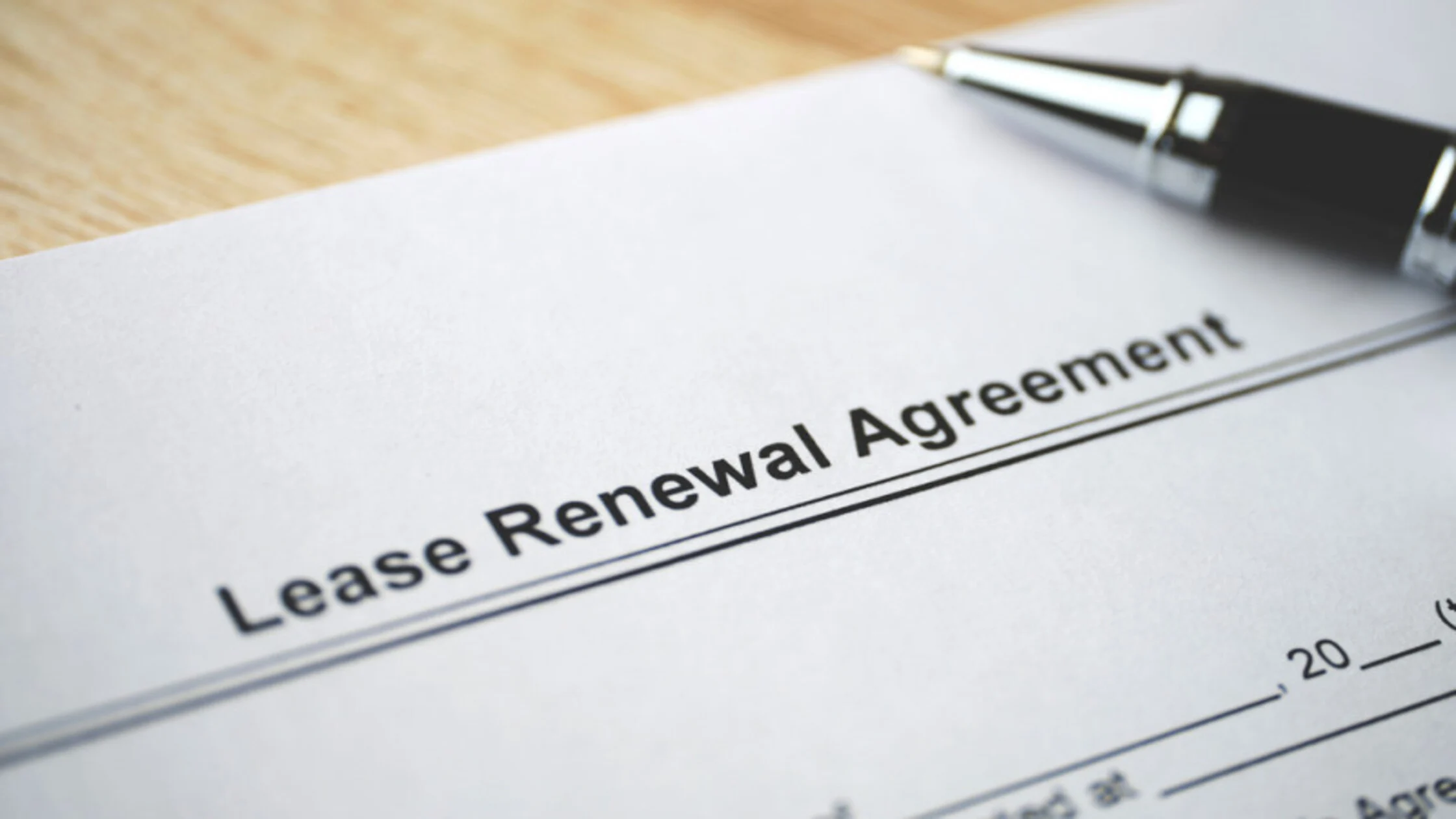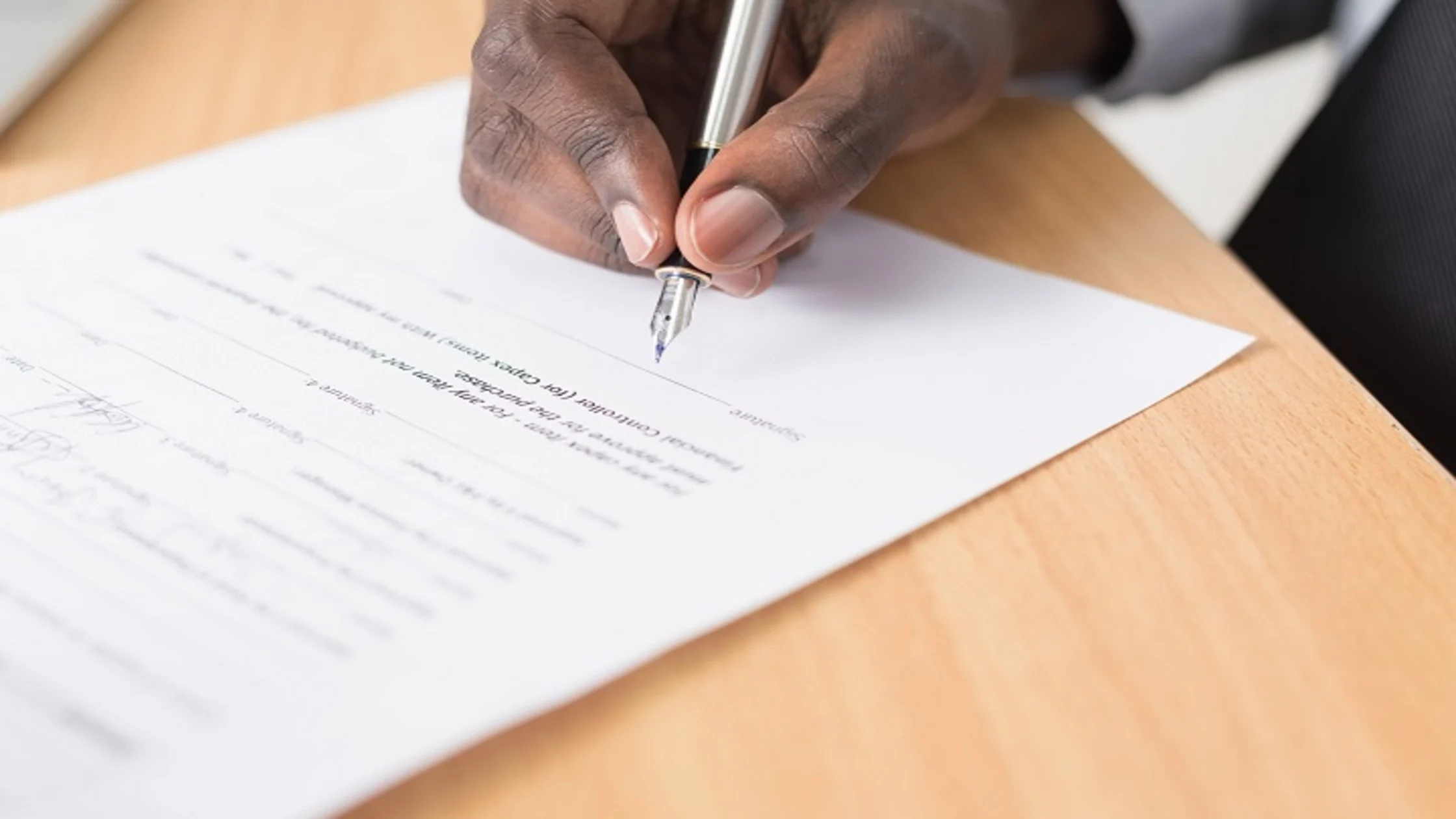With rental rates continuing to climb in 2025, more tenants are choosing to renew a lease agreement rather than move. But lease renewals come with their own rules, timelines, and risks. Before you commit, read our guide to understand your rights, your landlord’s responsibilities, and how to make the process work in your favor!

What Is a Lease Renewal Agreement?

A lease renewal agreement is a legally binding document that extends your current rental agreement for a new term (usually another 6 or 12 months) under similar or renegotiated conditions. This agreement can maintain the original lease conditions or introduce renegotiated terms, such as updated rent, revised maintenance responsibilities, or modified policies regarding pets and utilities.
Unlike starting from scratch with a brand-new lease, a lease renewal maintains the core terms of the original lease, making the process simpler and faster. However, it is not automatic—both the landlord and the tenant must mutually agree to the renewal terms.
There are two main variants landlords and tenants may use to renew a lease:
- Lease Addendum: This is an add-on document to the existing lease. It modifies or extends only specific terms, such as rent, lease duration, or pet policies, without rewriting the entire lease. The original lease remains in effect except for the changes explicitly stated in the addendum. Addendums are usually quicker and less formal than drafting a new lease, making them ideal for minor adjustments or short-term extensions.
- New Lease Agreement: A new lease agreement is a completely new contract that replaces the original lease. All terms, including rent, rules, and responsibilities, are reviewed and set anew for the upcoming rental period. While preparing a new lease may require more administrative work, it provides a clean slate for renegotiation and ensures clarity for both landlord and tenant.
The main Differences between Lease Renewal and New Lease Agreement
While they may sound similar, there are key differences between a lease contract renewal and a new lease agreement:
- Lease Renewal: Usually builds upon the existing lease. Terms often stay the same unless renegotiated (e.g., rent increase, updated policies).
- New Lease Agreement: Starts a brand-new contract. This may happen if significant changes are needed, a long lapse has occurred, or both parties want a fresh start. All terms, including rent, rules, and responsibilities, are reviewed and set anew.
Choosing to renew a lease agreement can be simpler and faster, but in some cases, especially when terms need to be significantly altered, a new lease might be the better path.
Pros and Cons of Renewing a Lease
Before committing to another lease term, it’s important to carefully weigh the advantages and disadvantages to determine if renewing truly aligns with your needs and circumstances.
Pros:
- Stability and continuity: Renewing your lease allows you to remain in the same home, avoiding the stress and disruption of moving. You maintain familiar routines, neighbors, and community connections.
- Avoiding the rental search hassle: You skip the time-consuming process of finding a new rental, including applications, credit checks, and potential application fees. Moving costs and logistical challenges are also avoided.
- Opportunity for negotiation: Tenants with a strong rental history can leverage their track record to negotiate favorable terms, such as property upgrades, minor renovations, or limiting rent increases.
- Predictable living arrangements: Knowing you have a secured place for another term can provide financial and personal stability, especially for families or professionals needing long-term certainty.
- Relationship with landlord: Continuing a good tenant-landlord relationship may give you priority consideration for future rentals or lease adjustments.
Cons:
- Rent increases: Landlords often raise rent during renewal, sometimes exceeding market rates, which can impact budgeting.
- Limited flexibility: Signing a renewal locks you in for the term of the lease, which may not align with changing life plans, such as job relocation or family needs.
- Deferred upgrades: Long-term tenants may not benefit from renovations or improvements offered to new renters, including modernized appliances, flooring, or other property enhancements.
- Complacency risk: Staying in the same unit may lead to less vigilance about lease terms or market alternatives, potentially missing out on better rental deals elsewhere.
- Negotiation leverage varies: Not all tenants can negotiate effectively, especially if rental demand is high; some may face mandatory increases or unfavorable adjustments.
What Should You Consider Before Renewing a Lease Agreement?

Even if you're comfortable in your current home, this section serves as a bridge: it guides you from understanding the concept of a lease renewal to evaluating your personal circumstances and then taking informed action. Before signing a new lease term, carefully consider your finances, lifestyle, and future goals to ensure that renewing truly aligns with your needs.
Understand Typical Lease Renewal Timelines
Timing matters more than you might think when it comes to lease renewals. Most landlords send a lease renewal notice 30 to 90 days before the lease ends, depending on state or local regulations. For example, in California, a 60-day notice is required for tenants who have lived there one year or longer; in New York State, landlords must provide 90-day notice if the tenant has occupied the unit for more than two years. This timeframe allows both landlords and tenants to review terms, plan for potential changes, or make moving arrangements.
As a tenant, you typically need to respond within 30 days of receiving the renewal notice. Missing this window may result in consequences, such as being moved to a month-to-month agreement with potentially higher rent, a landlord’s refusal to renew, or, in extreme cases, eviction. These are important to be aware of, but the primary focus should remain on planning your renewal around these timelines.
Review Your Living Situation and Future Plans
Does this home still work for you? Before deciding to renew your lease, it’s essential to step back and evaluate how well your current home fits your present needs and near-future plans.
- Consider your current living space: Is the size, layout, and available amenities still comfortable for you? Does the neighborhood meet your needs for commuting, safety, and access to services?
- Assess your financial situation: Can you comfortably afford the rent, utilities, and other living expenses for another lease term?
- Evaluate your lifestyle and personal goals: Think about your job, relationships, and daily routines. Is your current home supporting these aspects effectively?
- Look ahead to the next 6–12 months: Anticipate upcoming changes in work, finances, family, or personal circumstances. Are you planning a job relocation, expecting a family expansion, or considering a different lifestyle that may require more space or a different location?
- Reflect on long-term suitability: Consider whether the home will continue to meet your needs beyond the immediate lease term. Will your goals or circumstances likely change in ways that affect your living situation?
By thoughtfully reviewing these aspects of current space, finances, lifestyle, near-future plans, and long-term suitability, you can make a more informed decision about whether renewing the lease truly supports your needs.
Inspect the Property Before Committing
A thorough property inspection is critical because it directly impacts your decision to renew. Living in a space for months or years doesn’t guarantee everything remains in good condition. Before signing a renewal, check for issues in the following categories:
- Safety: Ensure smoke detectors and carbon monoxide alarms are functional. Inspect railings, locks, and any structural elements for hazards.
- Utilities: Verify HVAC systems, plumbing, and electrical outlets are in proper working order. Test appliances included in your lease.
- Maintenance: Look for leaks, mold, pest problems, or other signs of disrepair. Confirm that any lingering issues are scheduled to be addressed as part of the lease renewal process.
Conducting a detailed inspection ensures you are aware of potential problems before committing and helps you make informed decisions. While it also provides leverage for negotiation, the main purpose here is assessing the property’s condition as part of your renewal evaluation, not strategy for bargaining.
Research Market Rents and Compare Options
Before renewing a lease agreement, it’s important to understand the local rental market and evaluate whether staying in your current home truly offers the best value. Start by researching comparable listings in your neighborhood using rental platforms, local classifieds, or word-of-mouth from neighbors. Pay attention to factors like rent amounts, unit size, amenities, and lease terms.
Comparing your current unit with others helps you see whether a proposed rent increase is reasonable or above market rates. This data can also give you leverage for negotiation with your landlord, whether it’s to limit rent hikes, request upgrades, or secure more favorable lease terms.
Beyond direct rental comparisons, consider the broader implications of moving versus staying. Factor in moving costs, potential disruptions to your routine, and the stability of remaining in a familiar community. Sometimes, even if slightly higher, staying may offer advantages in convenience, amenities, and overall quality of life. Conversely, you may discover alternative rentals that better meet your space, budget, or lifestyle needs, making relocation a practical option.
By combining market research with a holistic comparison of costs, amenities, and lifestyle impacts, you can make a more informed, strategic decision about whether renewing your lease is the best choice.
Compare Renewal Terms With Market Alternatives
As a landlord, evaluating renewal terms is not just about maintaining the current rent—it’s about ensuring your property remains competitive while also securing reliable tenants. Comparing your renewal proposal with market alternatives gives you clarity on whether your offer is fair, sustainable, and attractive.
- Benchmark Your Rent Against the Market
Research comparable properties in the same area, focusing on unit size, amenities, and condition. If your current rent is below market value, a moderate increase may be justified. If it’s above, you risk losing good tenants to more affordable options.
- Factor in the Cost of Tenant Turnover
While a higher rent might look profitable, consider the potential cost of vacancies, marketing, and preparing the unit for a new tenant. Sometimes offering slightly below market rent keeps reliable tenants longer and reduces turnover expenses.
- Compare Lease Structures, Not Just Price
Competitors may attract tenants with flexible lease lengths, included utilities, or updated amenities. By comparing these terms, you can adjust your renewal offer strategically—whether through rent adjustments, service upgrades, or small concessions.
- Balance Financial Return and Tenant Retention
Your goal is to align profitability with tenant satisfaction. Offering terms that reflect current market standards while recognizing the value of a stable tenant relationship can help maximize long-term returns.
By comparing renewal terms with market alternatives, landlords can negotiate from an informed position—ensuring they protect their investment while presenting tenants with an offer that feels both fair and competitive.
Tip for tenants: You can negotiate renewal terms too. If something feels unfair, reach out to a tenants’ union, housing authority, or legal aid for guidance.
Best Time to Start the Renewal Process
The best time to begin is 60 to 90 days before your lease ends. Starting early gives you space to:
- Review the renewal terms from your landlord.
- Compare market rents and see if better options exist.
- Negotiate from a stronger position instead of rushing at the last minute.
- Plan ahead for any personal changes, like a new job or move.
By acting 2–3 months in advance, you stay in control and avoid being forced into quick decisions.
How to Renew a Lease Agreement?

A step-by-step list to guide you through the process is shown below:
- Review your current lease and take note of the expiration date.
- Communicate your intent to renew a lease agreement in writing.
- Negotiate any changes, such as rent increases or updated policies.
- Get a copy of the signed agreement for your records
Step 1: Review Your Current Lease and Local Laws
Before initiating a renewal, read through your existing lease carefully. Look for clauses regarding renewal procedures, automatic rollover, rent increases, and penalties for late notice. This will help you avoid surprises and clarify what’s negotiable.
Then, check local tenant-landlord laws, which vary widely by state or city. For instance, under Lease Renewal Rules in Washington State law, landlords generally must give at least 60 days’ written notice before increasing rent for a month-to-month tenancy. In addition, fixed-term leases don’t automatically renew unless the lease explicitly states so—meaning tenants and landlords need to actively agree on renewal terms.
Step 2: Research the market
Before you renew a lease agreement, compare comparable units. This helps you negotiate better terms for extended lease duration, continuing lease agreement, or minor updates.
Step 3: Communicate and Negotiate New Terms with Your Landlord
Once you decide to renew a lease agreement, notify your landlord in writing, ideally 30–60 days before your lease ends (or sooner, based on your lease terms). This written notice protects you legally and gives your landlord time to prepare paperwork.
At this point, you should also:
- Ask if there will be rent increases and by how much.
- Inquire about any policy changes (e.g., guest limits, pet deposits).
- Make requests for repairs or upgrades.
Step 4: Confirm the Lease Renewal in Writing
It’s important to confirm your intention to renew a lease agreement via email or letter as verbal agreements aren’t enough. Request a written lease renewal document that includes:
- The new lease term dates
- Updated rent amount
- Any changes to responsibilities or policies
- Signatures from both parties
Step 5: Sign the Renewal Agreement
After reviewing the final renew a lease agreement, it’s time to sign and secure your housing for the next term
Make sure all agreed-upon changes are correctly reflected and no unexpected clauses have been added. If everything looks correct:
- Sign the lease and date it
- Keep a copy for your personal records (digital and/or physical)
If the lease is delivered electronically, signing via a trusted e-signature platform (like DocuSign or HelloSign) is legally valid in most states.
How Long Do Tenants Have to Sign a Lease Renewal?
The amount of time a tenant has to sign a lease renewal isn't one-size-fits-all; it depends heavily on your original lease agreement and local tenant-landlord laws. In most states, landlords must provide between 30 and 90 days’ notice before the lease ends. This window gives tenants enough time to review the new terms, negotiate if needed, or make moving arrangements. Some areas, like Washington or California, may require longer notice periods—especially for month-to-month rentals or in rent-controlled cities.
For tenants, understanding this timeline is crucial. Responding within the notice period ensures you don’t lose your housing, face higher rent without preparation, or end up scrambling to secure a new place.
State-by-State Lease Renewal Notice Rules
Lease renewal laws vary significantly depending on where you live, and even local ordinances can override lease agreements. If you’re asking “What is the lease renewal notice period?”, the answer is that it depends entirely on state regulations. For example:
- California: In California, a 30-day notice is generally required for terminating a month-to-month tenancy, but a 60-day notice is often required from landlords to tenants for rent increases over 10% or non-renewals for tenancies of one year or more.
- New York: In New York City, landlords must provide notice of non-renewal or rent increases based on the tenant's length of residency. For example, a tenant living in a unit for less than a year requires 30 days' notice, while a tenant of two years or more requires 90 days' notice.
- Texas: Texas state law generally requires a minimum of 30 days' written notice from either party to terminate a month-to-month lease. For fixed-term leases, the renewal and termination process is typically governed by the terms of the lease itself, unless specific clauses are prohibited by law.
Always consult your current lease and your local government's official resources to confirm the specific notice requirements that apply to your situation.
Tenant Rights and Lease Obligations During Renewal

As you move into a renewed lease term, you should understand how your rights as a tenant continue or change and what obligations you’re expected to uphold under the new agreement.
Tenant Rights During Renewal
During the renewal process, tenants are protected by specific legal rights that ensure fairness, transparency, and stability in their housing arrangements:
- Right to Renewal Notification: Landlords must give tenants proper written notice—usually 30 to 90 days before the lease ends—about whether they intend to renew, change terms, or not renew the lease.
- Right to Negotiate Terms: Tenants have the right to discuss new conditions, such as rent adjustments, lease length, or policy changes, instead of accepting terms without question.
- Protection from Unjust Non-Renewal: In many states, landlords cannot refuse renewal for discriminatory or retaliatory reasons (e.g., reporting code violations).
- Right to Continued Occupancy: If tenants accept the renewal offer within the required period, they have the right to remain in the property under the new lease terms.
- Right to Review Written Renewal Document: Tenants are entitled to receive and review a written lease renewal that clearly states the new rent, term dates, and any changes before signing.
Tenant Obligations During Renewal
During the lease renewal process, tenants also have responsibilities that ensure a smooth continuation of their tenancy:
- Timely Response and Notice: Tenants must respond to the renewal offer within the timeframe specified by the lease or local law to secure their right to continue occupancy.
- Adherence to New Lease Terms: Once the renewal agreement is signed, tenants are legally bound to follow all updated terms, including rent, lease duration, and any revised policies.
- Maintain the Property and Follow Lease Rules: Tenants are expected to keep the property in good condition and continue abiding by all lease rules, such as noise restrictions, pet policies, and occupancy limits.
- Provide Updated Documentation If Requested: Landlords may request updated information, such as proof of income, renter’s insurance, or emergency contacts, to process the renewal properly.
New Lease Terms to Expect and Negotiate in 2025
Currently, rental markets shift and new regulations emerge. Lease terms are also evolving.
Rent Increases and Fee Changes
One of the most common adjustments tenants encounter is a rent increase. Alongside rent, landlords are increasingly adding additional fees. It’s wise to ask whether fees can be waived or bundled into your rent.
For example, In California, rent increases are regulated under the Tenant Protection Act of 2019 (AB 1482), which limits how much landlords can raise rent annually. For most properties covered under this law, rent can only increase by 5% of the current rent plus the local inflation rate, or 10% total—whichever is lower.
Changes in Lease Length or Flexibility
Lease flexibility is also shifting in 2025. More landlords are offering customized lease lengths, such as six-month, nine-month, or even “flex-term” leases, to accommodate varying tenant needs and market conditions.
Some leases now include buy-out clauses that allow tenants to get out of a lease early with a fixed penalty, a valuable feature for those with uncertain timelines.
Additional Costs (Maintenance, Parking, etc.)
Beyond rent, tenants should watch for new or adjusted charges related to maintenance, parking, and utilities. Some landlords are introducing maintenance cost-sharing models, where tenants are responsible for the first portion of a repair bill (e.g., the first $50 of any service call). Parking spaces, once included in rent, are increasingly being priced separately, especially in high-demand areas.
Tips to Negotiate Better Terms for Your Lease Renewal

With the right approach and a little prep, you can negotiate terms that better fit your lifestyle and budget.
Asking for Rent Discounts or Incentives
Even in a competitive market, landlords are often open to small concessions. If you’ve been a reliable tenant who pays rent on time, keeps the property in good shape, and hasn’t caused issues, you have leverage. Don’t be afraid to ask for a modest rent reduction, or at the very least, to hold your rent steady.
You can also request perks like a free month of rent, waived fees, or a discount for paying multiple months upfront.
Negotiate for Flexibility (Subletting, Pets, etc.)
A lease that fits your life is just as valuable as one with affordable rent. Ask about subletting flexibility, whether pet restrictions can be eased, or if early termination clauses can be added. In some cases, landlords may allow these changes with added deposits or monthly fees.
Using Market Data and Tenant History to Your Advantage
Before signing, do a quick scan of rental listings in your area. Are similar units going for less? Is your building offering move-in specials to new tenants? Use this information to show your landlord what’s competitive. Combine that with your own tenant history to justify why they should offer you favorable terms.
Keep Communication Professional and Timely
When approaching your landlord, keep your tone professional and your requests specific. A polite email that outlines your questions or counter-offer often goes further than you think.
Know When to Walk Away or Request a Month-to-Month Lease
Don’t be afraid to walk away. You can also ask about switching to a month-to-month lease, giving you breathing room while you search for something better. Flexibility often comes at a slightly higher rent, but for many renters, it’s worth the tradeoff.
Bonus: Checklist of Key Questions to Ask Before Lease Renewal
Take a look at our handy checklist! You can copy, print, or share it with your friends and family.
Questions to Ask Before You Renew Your Lease:
Final Thoughts
Renew a lease agreement only after you’ve weighed the pros and cons, reviewed updated terms, and clarified expectations with your landlord. With housing trends shifting and new clauses appearing in 2025 leases, it’s more important to update the guidelines! For additional resources, check out our lease agreement templates and explore our tenant background screening services to make informed decisions. In addition, LeaseRunner will publish up-to-date guides on our blog promptly to keep you in the know.
FAQs
Q1. How does renewing a lease work?
Before the lease ends, your landlord will send a renewal offer, possibly with updated terms like rent changes or policy updates. If you agree to the new terms, you’ll sign the renewal and continue living there without moving out.
Q2. When should you renew a lease?
You should aim to renew a lease agreement about 30 to 60 days before your current lease ends, depending on your state laws and lease terms. Giving notice early gives you time to review new terms, negotiate if needed, or plan to move if you choose not to renew.
Q3. Can you renew a lease on an apartment?
Yes! You can renew a lease on an apartment as long as both you and your landlord agree to the new terms. Most apartment leases are renewed annually, and management typically reaches out with renewal offers a few weeks or months before the lease ends.







